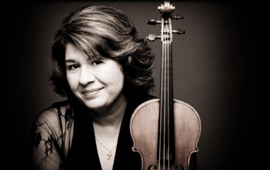> [Archived] Interviews

An Interview with the Violinist Mihaela Martin
What is, for you, the significance of Romania's National Day and of a concert on one of the most important stages of the world, dedicated to this celebration?
Romania's National Day is a holiday that all Romanians identify with and we celebrate it with all our hearts. Being able to participate in this concert dedicated to the National Day makes me very happy and I am, indeed, delighted to make a contribution to celebrating Romania, even if I don't live in Romania anymore.
You'll interpret the Concerto for Piano, Violin, Cello and Orchestra by Beethoven, together with Frans Helmerson and Cristian Niculescu and the mezzo-soprano Ruxandra Donose will also be on stage. How did you receive the invitation to participate in this concert and how was the programme chosen?
This project had been discussed before summer and our colleague Cristian Niculescu from Berlin was in touch with the Romanian Cultural Institute. The programme was chosen so as to include a work for three soloist instruments, so it has a certain standing, certain grandeur. That is why we thought that it would be appropriate for the occasion, Romania's National Day.
You have an extensive international career. Are the origins of an artist still important nowadays?
This is a difficult question, because nowadays life is very much based on globalization; but when an artist has a strong personality, I believe that his 'cultural baggage' is also reflected. Somewhat indirectly, given our roots, the culture in which we were educated, the musical personality gets a clearer character. For example, I can often realize if the musicians or artists were educated in the USA, Asia or the European culture. Of course, I was heavily influenced by the Romanian culture - when I lived there, growing up and going to school. So, I believe that everything which constitutes the basis of my musical personality comes from Romania.
Translated by Mihaela Olinescu and Elena Daniela Radu
MTTLC, The University of Bucharest














